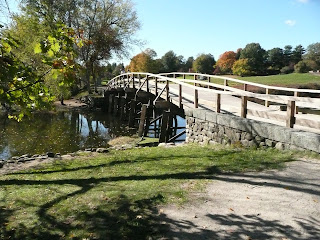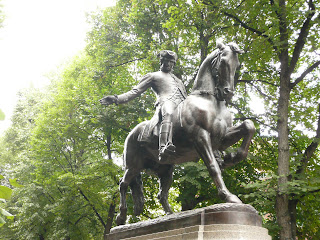We headed back the way we came, to Concord, Massachusetts. You may wonder why we went to Cooperstown, back to Boston, and then took a limo bus down to New York City. Because it was considerably cheaper than paying the drop-off charges for a one-way car rental! And that way, we got to "leaf peep" in Massachusetts twice! I know, I know...it does sound kind of weird to put it like that, doesn't it? I didn't invent the term.
Concord is a small town outside of Boston and it is important to U.S. history for two reasons. One is its role in the outbreak of the American Revolution (War for Independence, call it what you will), and the other is that many important American authors of the nineteenth century lived and worked there. Louisa May Alcott, Henry David Thoreau, Nathaniel Hawthorne, Ralph Waldo Emerson, to name but a few. You all read them, right? Nod your head and say "yes."
We had wonderful accommodations at the Colonel Roger Brown House on Main Street in Concord. The room had kitchen facilities. Those have been a key aspect in the lodgings search for this walkabout, because we prefer to cook for ourselves most of the time. The idea is to live in places, even if our stay is a short one, instead of doing the hotel and restaurant thing. Lauri Berlied was a wonderful hostess, and we had a great time talking with her. We highly recommend this place and hope to be back there ourselves.
The National Park Service maintains Minuteman National Park which stretches from Lexington out to Concord, along the old road which served as the British line of march in April 1775. At the Old North Bridge, Massachusetts militia opened fire on advancing British troops when they saw smoke rising from the center of town. The original wood in the bridge has, of course, been replaced more than once over the years, but this is where it happened.
We have been lucky time and again with the timing of our visits to places. This time was no exception. The park had redcoat reenactors that weekend. Also, we saw an evening play at Hartwell Tavern between Concord and Lexington, in which park rangers acted in character and costumes from 1775. Monica Squires was one of the reenacting rangers. We met her in Toulouse earlier this year, where she was finishing up a period of teaching in France. Now she teaches high school history in New Hampshire.
This tavern is along the old road. As the British retreated along it toward Boston, Minutemen harassed them from the trees. Penny's ancestor, Increase Claflin, was a minuteman of the Hopkinton militia which was one of those that moved up to fire on the redcoats. Here she is, standing at the place where that unit attacked the lobsterbacks.
Now, Penny never misses a chance to point out that her ancestors all fought on the right side of the war, and that one of mine was a Tory militiaman from Stone Arabia, New York. He ended up in Ontario. That one happens to be the one whose surname I bear, but I had other ancestors from the other side. Just to set the record straight.
I also went down to Lexington, Mass., where the first militia to oppose the British advance were fired upon and brushed aside. Lexington is as picturesque a New England town as ever there could be.
See what I mean? I took the picture above from Lexington Green, where the skirmish took place. This next one marks the line where the Minutemen mustered to face the British.
The literary legacy of Concord is quite astonishing. Several houses survive where they had lived at different times, and many of them are buried in Concord's cemetery. It is really something to look around and see headstone after headstone that remind you of the table of contents of your junior year English textbook.
Nathaniel Hawthorne lived here, near the Old North Bridge.
Alcott and Hawthorne both lived at this house at different times. Because it had been the property of a minuteman, it qualified for inclusion in the national park, but the presentation there is all about American literature.
These are only a couple of the author-related sites in Concord, which was an intellectual center of the transcendentalist movement. Henry David Thoreau lived for a while at Walden Pond and wrote about his experiences.
We took the commuter train into Boston one day. Again, the American Revolution's history has an important and permeating presence in this great city. The Freedom Trail is a walking tour of important sites of Boston of the period.
Listen my children, and you shall hear of the midnight ride of Paul Revere.
The Freedom Walk ends at the old Charlestown Navy Yard, home to the sailing frigate USS Constitution.
Boston is a great city, almost as nice as San Francisco.
After a long day on our feet, we were glad to get back to Concord and the Roger Brown House. The next day, we took the car back to Cambridge. This was quite a feat, because there was a lot of traffic due to the Harvard-Lehigh football game. But we made it, and then took a cab to the hotel to get the limo bus down to New York.
We will be back to Boston, again and again. Just not in the winter.




















































